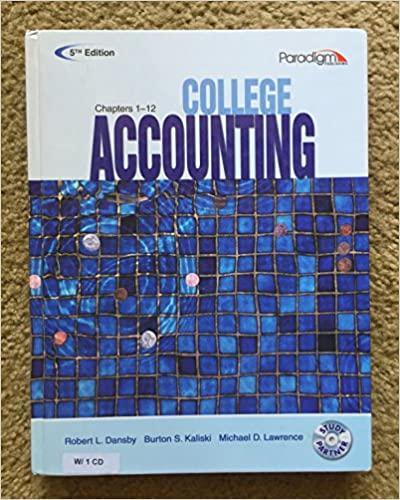Question
On 1 April 20X3, Gamma purchased 75% of the equity shares of subsidiary X for a cash payment of $99 million. The fair value of
On 1 April 20X3, Gamma purchased 75% of the equity shares of subsidiary X for a cash payment of $99 million. The fair value of the net assets of subsidiary X on that date was $108 million. Gamma measured the non-controlling interest in subsidiary X using the proportionate method. On 31 March 20X4, Gamma reviewed the goodwill on acquisition of subsidiary X for impairment but no impairment was evident. On 31 March 20X5, the carrying amount of the net assets of subsidiary X in the consolidated financial statements of Gamma (excluding goodwill on acquisition) was $115 million. Subsidiary X is a single cash-generating unit for impairment purposes. On 31 March 20X5, the value in use of subsidiary X was $135 million and its fair value less costs of disposal was $130 million. IAS 10 a) Ding Dong Limiteds (Ding Dong) financial year ends on 31 December. On 20 December 2013, Ding Dong was involved in a court case with a customer who sued the company for delivering products where there was a dispute over the exact ingredients included in the products manufactured by Ding Dong. These products were delivered to the customer in October 2013. The details of the case were heard by 22 December but the judge decided to reserve her judgment until 8 January 2014. On 8 January 2014, the judge ruled in favour of the customer, awarding it damages of 100,000. b) Ding Dong Limited has an investment worth 1,000,000 in its financial statements at 31 December 2013. Due to the continuing recession, the investment reduced in value to 900,000 by 15 January 2014. c) On 8 January 2014, one of the accountants left Ding Dong suddenly. On further investigation, the company realised that this employee had been paying himself money from the bank account in relation to false rental invoices. The amount of the overpayment was found to be 86,000. With the help of the police, the accountant was tracked down and repaid all of the money on 18 January 2014. d) Ding Dong Limited sold a truck on 31 December 2013 for 20,000. This truck had been purchased on 1 January 2008. On 31 December a non-refundable deposit of 15,000 was paid towards a new truck and a cheque was posted with the balancing payment of 50,000. This cheque was not received and cashed by the seller until 4 January 2014. e) On 8 January 2014, one of the accountants left Ding Dong suddenly. On further investigation, the company realised that this employee had been paying himself money from the bank account in relation to false rental invoices. The amount of the overpayment was found to be 86,000. With the help of the police, the accountant was tracked down and repaid all of the money on 18 January 2014.
Step by Step Solution
There are 3 Steps involved in it
Step: 1

Get Instant Access to Expert-Tailored Solutions
See step-by-step solutions with expert insights and AI powered tools for academic success
Step: 2

Step: 3

Ace Your Homework with AI
Get the answers you need in no time with our AI-driven, step-by-step assistance
Get Started


